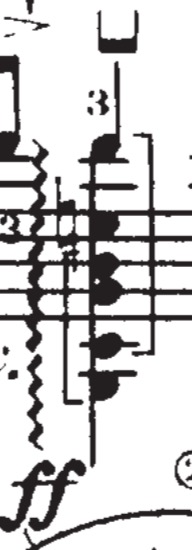Page 1 of 2
multi-stop slur question (violin)
Posted: 27 Sep 2021, 17:44
by MichelRE
For some reason I remember reading that a string multi-stop that was notated as a grace note, then regular notes, for example the bottom two notes of a 3-note chord, tied to the last held notes of the chord... imagine an open position C major chord: C - G - E where the C and G are grace notes, the G is tied to a double stop of G and E.
ugh, I know this is hard to explain with words. if I have to I'll create an example in Finale or something.
Anyway, I remember reading that the grace note(s) of such a multi-stop had to have a slur, like any grace note(s).
Yet in Gould's examples of notation of chords, she has no slurs at all.
Does this mean that I shouldn't bother with them? They are always such a pain to adjust because of the range of notes generally covered.
EDIT***
I pulled a fragment from the work in question
Re: multi-stop slur question (violin)
Posted: 27 Sep 2021, 20:39
by John Ruggero
In this case, I think a slur would be fussy clutter. But then I think that the modern practice of using slurs for all grace notes is also fussy clutter, since they are slurred by default 99.999% of the time, and for the remaining .001% it would be advisable to put some sort of articulation mark on the grace note, since otherwise, no one is going to notice the missing slur and the grace note will stlll be played legato.
Gould says grace notes should be slurred, but then gives examples where they are not without negative comment, but I think that might be for clarity in the examples since she is discussing other matters.
Re: multi-stop slur question (violin)
Posted: 28 Sep 2021, 02:12
by MichelRE
Thank-you John.
I guess I'll do without the clutter, then!
I always find adjusting the slurs for this type of notation to be a right pain in the bass.
Re: multi-stop slur question (violin)
Posted: 28 Sep 2021, 02:23
by John Ruggero
Yeh, let's start an anti-clutter movement.
Re: multi-stop slur question (violin)
Posted: 29 Sep 2021, 18:27
by MichelRE
I'm all for anti-clutter!
Re: multi-stop slur question (violin)
Posted: 30 Sep 2021, 22:38
by OCTO
MichelRE: You don't need to write the "performance mode" if it is not of a certain purpose, and in that case the slur is the way it is written, as John said. Maybe the purpose is to accentuate the last note, not the bottom?
If it is just a chord, than write just the chord, if it is a melody that has an acciaccatura before the beat, then notate it as the grace.
As said, violinists don't like that clutter, here is a chord from Ysaye Sonata 3, not at all difficult to perform (not at all = for professionals), and the fingering reveals that there is just one way to do it, so no "performance mode" is needed:

- Screenshot 2021-10-01 at 00.35.14.jpg (29.33 KiB) Viewed 3574 times
Re: multi-stop slur question (violin)
Posted: 01 Oct 2021, 02:32
by John Ruggero
I think OCTO just joined our anti-clutter club. Michel, and has the best answer.
OCTO, is that 6-note chord played as two continuous quick triple stops, down and then up bow?
Re: multi-stop slur question (violin)
Posted: 01 Oct 2021, 10:34
by David Ward
What a wonderfully atmospheric piece that Ysaÿe 3rd sonata is. After reading OCTO's post above, I've just listened to Alina Ibragimova playing it on her CD of all six sonatas. I should maybe get the score as I expect there will be something to be learnt from it.
Re: multi-stop slur question (violin)
Posted: 01 Oct 2021, 13:08
by John Ruggero
Or is the Ysaye chord a double stop open G-B and then the rest as a quadruple stop? In any case, wouldn't it be clearer to show the two as two differently stemmed, interlocked chords, if that is how it is done? The brackets don't seem to be specific enough.
Re: multi-stop slur question (violin)
Posted: 01 Oct 2021, 15:10
by David Ward
I *think* perhaps it's played something a bit like this (screenshot) all in one down-bow. OCTO will be able to confirm or not.
I'm wondering whether to buy the study score (cheaper) or performer's score (easier on my ancient eyes): both Henle.